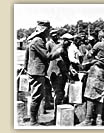
and the Communists,
who condemned the campaign as being an imperialist and colonial war.
The opposition between Venzelists and anti-Venizelists over the issue of Greek foreign policy,
an opposition in which wider social and political oppositions were at stake,
was intense and led from the outbreak of the First World War
to the National Schism. From 1917 Venizelos, the Prime Minister of (by now) a unified Greece, implemented
his foreign policy and launched the Asia Minor Campaign. The anti-Venizelists condemned the
campaign and as a pre-electoral slogan: in the elections of November 1920 they had adopted the slogan
'a small but honourable Greece' and promised the military disentanglement of Greece from the war.
However, despite pre-electoral promises the post-November governments pursued
the Asia Minor war, fearing that a likely disentanglement might be taken as a betrayal of national visions.
The Socialist Labour Party of Greece (SEKE) opposed the Asia Minor Campaigm considering it an
imperialist act, in the same vein as the Ukranian campaign. This opposition was upheld
in its electoral campaign in the elections of November 1920. The newspaper Rizospastis
published articles daily against the campaign. In the army itself Communist soldiers formed the Front Central Committee to spread anti-war propaganda.
|
